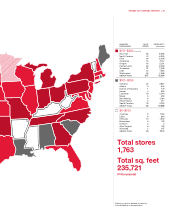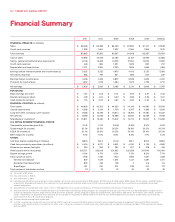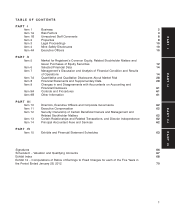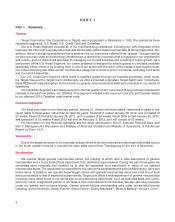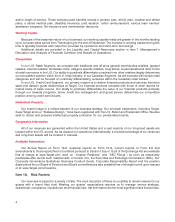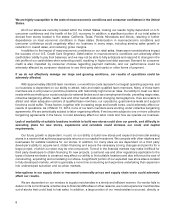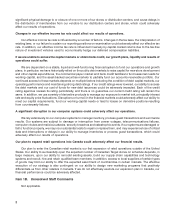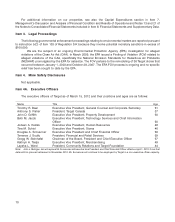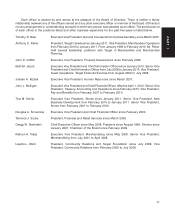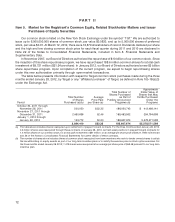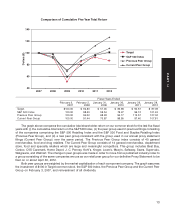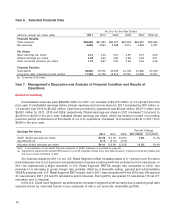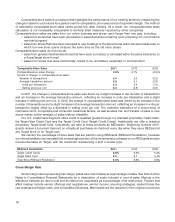Target 2011 Annual Report Download - page 31
Download and view the complete annual report
Please find page 31 of the 2011 Target annual report below. You can navigate through the pages in the report by either clicking on the pages listed below, or by using the keyword search tool below to find specific information within the annual report.
indirectly, from outside the United States, with China as our single largest source. Political or financial instability,
trade restrictions, the outbreak of pandemics, labor unrest, transport capacity and costs, port security or other
events that could slow port activities and affect foreign trade are beyond our control and could disrupt our supply of
merchandise and/or adversely affect our results of operations. In addition, changes in the costs of procuring
commodities used in our merchandise or the costs related to our supply chain, including labor, fuel, tariffs, and
currency exchange rates could have an adverse effect on gross margin, expenses and results of operations.
Failure to address product safety concerns could adversely affect our sales and results of operations.
If our merchandise offerings, including food, drug and children’s products, do not meet applicable safety
standards or our guests’ expectations regarding safety, we could experience lost sales and increased costs and be
exposed to legal and reputational risk. All of our vendors must comply with applicable product safety laws, and we
are dependent on them to ensure that the products we buy comply with all safety standards. Events that give rise to
actual, potential or perceived product safety concerns, including food or drug contamination, could expose us to
government enforcement action or private litigation and result in costly product recalls and other liabilities. In
addition, negative guest perceptions regarding the safety of the products we sell could cause our guests to seek
alternative sources for their needs, resulting in lost sales. In those circumstances, it may be difficult and costly for us
to regain the confidence of our guests.
If we fail to protect the security of personal information about our guests and team members, we could be
subject to costly government enforcement actions or private litigation and our reputation could suffer.
The nature of our business involves the receipt and storage of personal information about our guests and team
members. If we experience a data security breach, we could be exposed to government enforcement actions and
private litigation. In addition, our guests could lose confidence in our ability to protect their personal information,
which could cause them to discontinue usage of our credit card products, decline to use our pharmacy services, or
stop shopping at our stores or Target.com altogether. The loss of confidence from a data security breach involving
team members could hurt our reputation and cause team member recruiting and retention challenges.
Our failure to comply with federal, state or local laws, or changes in these laws could increase our expenses.
Our business is subject to a wide array of laws and regulations. Significant legislative changes that affect our
relationship with our workforce could increase our expenses and adversely affect our operations. Examples of
possible legislative changes affecting our relationship with our workforce include changes to an employer’s
obligation to recognize collective bargaining units, the process by which collective bargaining agreements are
negotiated or imposed, minimum wage requirements, and health care mandates. In addition, changes in the
regulatory environment regarding topics such as banking and consumer credit, Medicare reimbursements, privacy
and information security, product safety or environmental protection, among others, could cause our expenses to
increase without an ability to pass through any increased expenses through higher prices. In addition, if we fail to
comply with applicable laws and regulations, particularly wage and hour laws, we could be subject to legal risk,
including government enforcement action and class action civil litigation, which could adversely affect our results of
operations.
Weather conditions where our stores are located may impact consumer shopping patterns, which alone or
together with natural disasters in areas where our sales are concentrated, could adversely affect our results
of operations.
Uncharacteristic or significant weather conditions can affect consumer shopping patterns, particularly in
apparel and seasonal items, which could lead to lost sales or greater than expected markdowns and adversely
affect our short-term results of operations. In addition, our three largest states, by total sales, are California, Texas
and Florida, areas where hurricanes and earthquakes are more prevalent. Those natural disasters could result in
7
PART I


